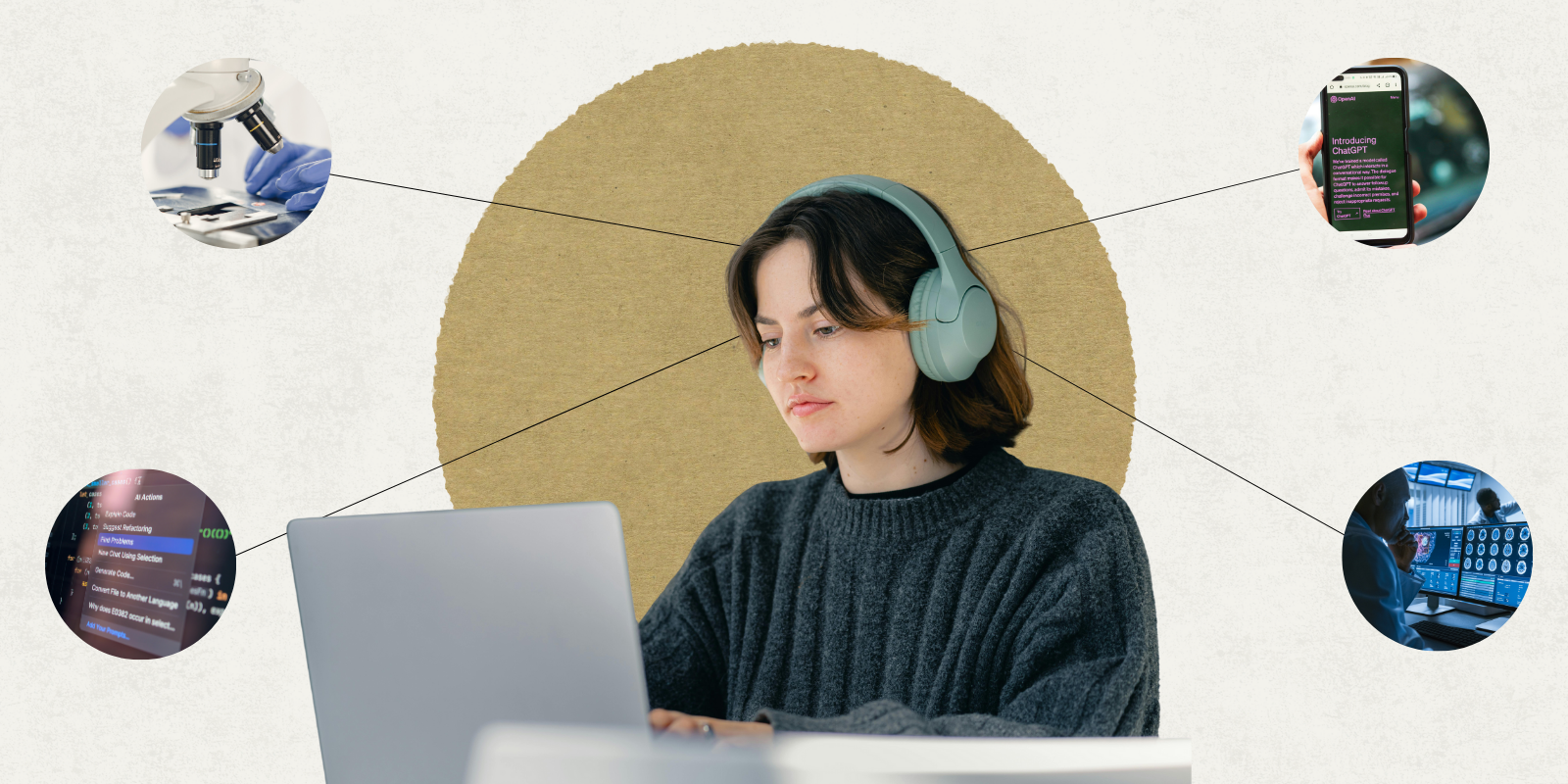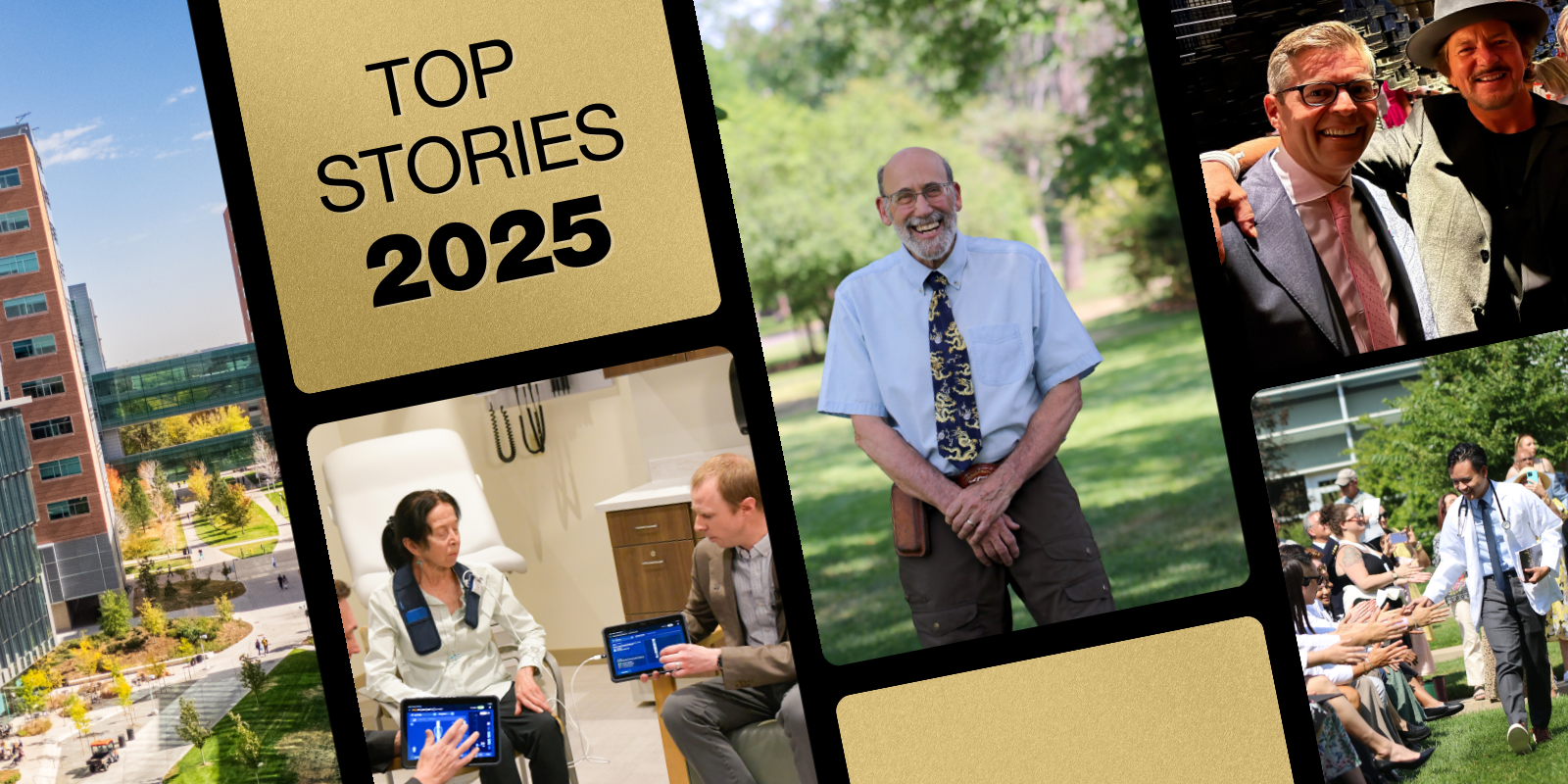Alexandra (Lexie) Ross vividly recalls her childhood dreams to become either an inventor, an astronaut, and/or the new lead singer for the Backstreet Boys. However, in fifth grade, her teacher drew a chalk outline of a heart on the asphalt outside of school where Ross and her classmates could walk through the ventricles as blood cells, studying every detail of the organ. It was at that moment that a career in medicine started to become her new dream.
In the years following, Ross’ personal health experiences drew her closer to medicine. Her father’s ischemic stroke showed her how compassion from health care professionals could go a long way. As a high school sophomore, Ross was given refreshing perspective on an injury from her orthopedic surgeons and credits their support for helping her achieve her goal of playing Division I water polo at Stanford University.
As she awaits her orthopedic residency match, Ross reflects on the many ways sports medicine has come in and out of her life. From patient to provider, she is inspired by orthopedic sports medicine, but is keeping her mind open to other orthopedic subspecialties. Alongside becoming a resident, Ross is a mother, wife, athlete, and teammate. She knows that wherever she matches, community will be at the forefront of her focus.
A personal connection to the impact of medicine
“When I was in high school, my dad had a severe stroke. It was devastating for our family and was my first up-close experience with the health care system, one I wish I didn't have to go through,” Ross says. “He had, and still has, severe aphasia where he is unable to communicate well.”
Ross’ father has had to adjust to a completely new way of life, and in order to connect with him, so has Ross.
Over time, her family developed a shared language comprised of writing, drawing, acting, using synonyms and similar sounding words to communicate with Ross’s father.
“Caring for him in this way was a form of advocacy,” she says. “Others wouldn't bother trying to talk to him. As a physician now, I sometimes need to translate my patient’s symptoms to their loved ones and explain what's going on inside, and that brings the experience full circle.”
Ross’ father now volunteers at a food pantry, conducts trail cleanups, and is a “public transport guru,” since he can’t drive. He has taken the Amtrak train from visiting Ross in Colorado back to Laguna Beach, California, where Ross was raised.
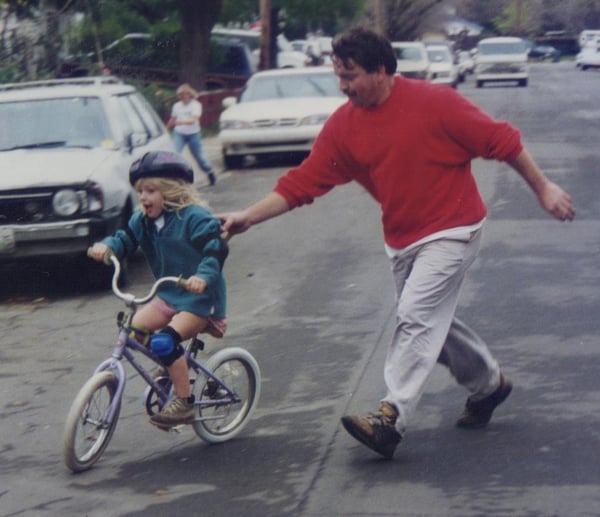
Ross's father teaching her how to ride a bike.
The power of teamwork beyond the ball
Throughout high school, Ross had to navigate chronic injuries and was simultaneously getting recruited by Division I universities to play water polo. Worried about how surgery might affect her chances at playing in college, she formed a close connection with her team of orthopedic surgeons
“I would zoom between practice and physical therapy, determined to work through my injury without surgery,” Ross says. “I felt like the orthopedic and physical therapy teams were on my side. They saw what my goals were, and that informed my treatment plan.”
With the help of her medical team, Ross went on to play at Stanford University for four years and studied Human Biology with an academic concentration in Health and Human Performance. “Water polo is such a team sport, and I was playing with women who eventually went to the Olympics. I remember showing up to practice every day and thinking ‘how can I use my role to empower my teammates and help us achieve our goals?’ It was a humbling experience.”
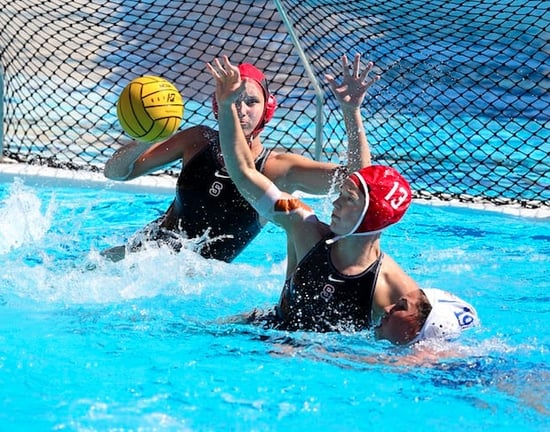
Ross (right) blocking a shot.
After completing her undergraduate studies, Ross needed to work three jobs to pay rent in the Bay Area. She was a research coordinator at the Stanford Sports Medicine Clinic, got her emergency medical technician (EMT) license working for a medical services company, and coached youth water polo.
However, Ross yearned to explore her purpose even further. She got involved with Chhahari Inc., a nonprofit organization in Nepal that supports at-risk youth in a shared hostel in Kathmandu. The children in the hostel experienced familial struggles, such as addiction, and some were orphans.
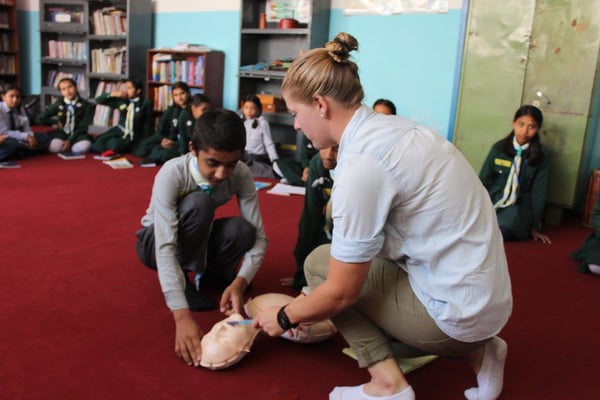
Ross teaching first response course to Nepalese children.
The first time she volunteered in Nepal, she spent a lot of time working in the secondary school and taught a poetry class. The children “destroyed her in the game of chess on the daily,” she says. The three weeks Ross volunteered sparked an interest to pursue global nonprofit work.
In April 2015, nine months after she returned from volunteering, the Gorkha earthquake struck Nepal. “It was devastating, and I felt like all I could provide from so far away was money and the direct inspiration to design the first response course. I wanted to empower the community I loved with knowledge and skills in addition to supplies.”
Ross returned to Nepal in 2017 with a focus on medical support through Chhahari. Ross piloted the first response course and taught it to children at the Chhahari hostel, the local secondary school, and local boy and girl scout troops. She taught cardiopulmonary resuscitation (CPR), automated external defibrillator (AED), choking, how to obtain vital signs, bleeding control, bandaging, splinting, and primary/secondary patient assessment.
To this day, Ross stays in connection with some of the children from the hostel, and is on the Board of Directors for Chhahari Inc.
Community and COVID-19
The University of Colorado School of Medicine was her top choice for medical school, but it was not the experience she expected due to the COVID-19 pandemic.
“I was able to still have a fully fledged academic experience; it just looked a little different,” Ross says. “My cohort still had six months of normalcy in fall 2019. When COVID-19 hit, we had to transition to virtual learning. I remember my cardiovascular, pulmonary, and renal course being the hardest because I was still figuring out a virtual learning strategy.”
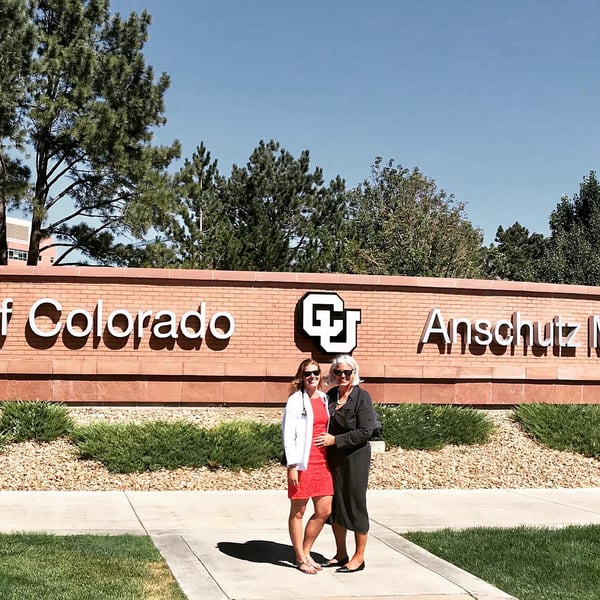
Ross and her mother at the White Coat Ceremony, 2019.
Ross’ clinical rotation year also presented challenges because it required a certain degree of risk with COVID-19. “It felt like a privilege to cross those barriers with patients, though,” she says. “The commitment I made to be next to my patients showed that I wanted to navigate the challenges of a pandemic with them. I learned to give a piece of myself to my patients.”
Ross ties her resiliency to her close friends that she made in her cohort.
“I met my best friends on day one of medical school. We felt like a bunch of kindergarteners, but I was 27 at the time,” she says. “We each had our own strengths we used to build each other up. When we had to initially retreat because of COVID-19, that was challenging because I missed connecting with them more often. We made it through and are still really close.”
Competing for new goals
When it came to deciding on a specialty for clinical rotations, Ross knew the orthopedic field, particularly a sub-specialty in sports medicine, was competitive, and she felt nervous about that decision. Unsurprisingly, her connection to water polo was part of her decision to continue pursuing the field.
“One of my biggest mentors throughout medical school was Kenneth Hunt, MD, whom I met at Stanford when I was looking for research opportunities during my undergraduate years,” Ross says. “He was a team physician for my water polo team, and when I found out he moved to Colorado around the same time I was in medical school, I couldn’t pass up on the opportunity for mentorship. He's given me trust to lead my own projects.”
Ross is also mentored by Rachel Frank, MD, director of a lab studying surgical and non-surgical joint preservation techniques for the knee and shoulder, with a special focus on female athletes. “It is nice to see a vision of myself as her one day, in a field that inspires me,” Ross says. “She gave me advice on how to reach my next steps in my career.”
Another of Ross’ orthopedic mentors is Frank Scott, MD, medical student advisor for orthopedics. “He has helped me see the big picture,” Ross says.
“Foot and ankle interest me, as well as orthopedic oncology and hand surgery. I'm very nervous about Match Day,” she says. “All the pieces inform your decision for where you’d like to match, and I want to make sure I’m taking care of and staying close to my family. But it’s good nerves!”
Ross remains nervous about pursing orthopedic surgery, due to its competitive nature, but her trajectory from personal to collegiate to worldly impact in medicine, alongside her refreshing outlook on teamwork, sets her up to be a leading contender.
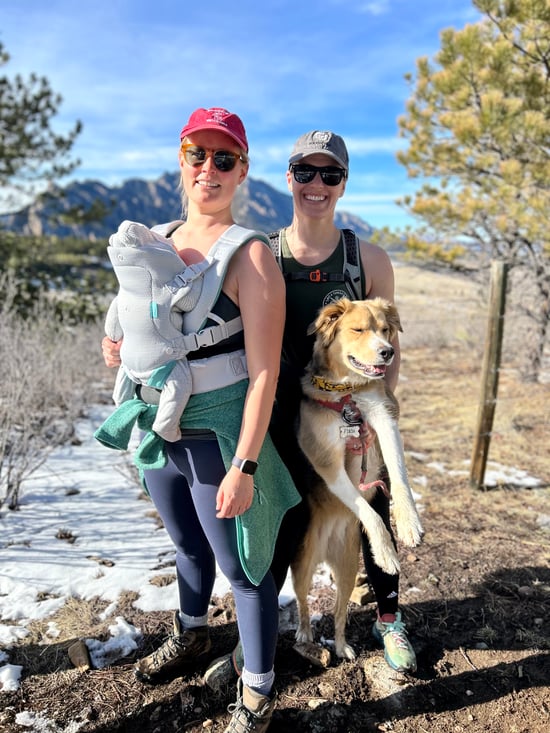
Ross (right) with her wife, son, and rescue dog out on a hike in January 2019.
Ross matched in Orthopedics at Stanford University.


